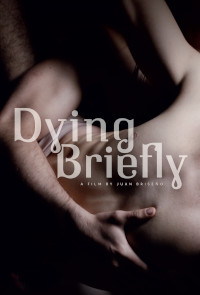| SHADOWS ON THE WALL | REVIEWS | NEWS | FESTIVAL | AWARDS | Q&A | ABOUT | TALKBACK | |||||||||||||||||||||
 Shadows off the beaten path Shadows off the beaten pathIndies, foreign, docs and shorts...
On this page:
APRIL |
DYING BRIEFLY |
THE UGLY STEPSISTER
| |||||||||||||||||||||
| See also: SHADOWS FILM FESTIVAL | Last update 18.Apr.25 | |||||||||||||||||||||
|
April Review by Rich Cline | 
| |||||||||||||||||||||
 dir-scr Dea Kulumbegashvili prd Luca Guadagnino, Ilan Amouyal, David Zerat, Francesco Melzi d'Eril, Archil Gelovani with Ia Sukhitashvili, Kakha Kintsurashvili, Merab Ninidze, Roza Kancheishvili, Ana Nikolava, David Beradze, Sandro Kalandadze, Tosia Doloiani, Beka Songhulashvili, Nika Beridze, Aleksandre Khvedelidze, Elene Makashvili release US/UK 25.Apr.25 24/Georgia 2h14 VENICE FILM FEST TORONTO FILM FEST  SUNDANCE FILM FEST Is it streaming? |
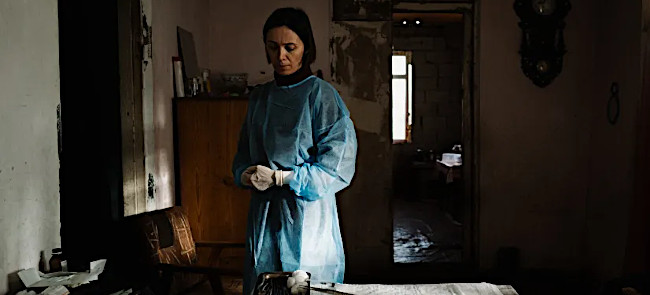 Ambitious and artistic, this boldly provocative Georgian drama skilfully keeps the audience in a state of distress. Writer-director Dea Kulumbegashvili uses a mix of naturalistic performances, deliberately challenging camerawork and freaky effects to create a dark, creepy tone. Yes, this kind of filmmaking is indulgent, as it often leaves the audience trying to work out why extended, vague scenes are included. But the film still has real power. In a community hospital in rural Georgia, top maternity ward doctor Nina (Sukhitashvili) finds herself under investigation after a baby died during childbirth. Her supportive boss (Ninidze) and her ex, fellow doctor David (Kintsurashvili), are unaware that she has another job out of hours, travelling to surrounding villages to illicitly provide reproductive care to desperate women. This includes dispensing the pill and performing abortions. Nina knows that if she didn't do this, someone else would, and far less safely. And her secret is about to catch up with her in a series of gruelling encounters. Throughout the film, Nina faces a grotesque, eyeless figure who seems to be an imperilled vision of herself. Or maybe the monster others think she is. Or perhaps the foetuses she has terminated. This is never explained, and the figure is sometimes juxtaposed with other characters, pulling us into Nina's internalised perspective. Much of the film is shot directly through her eyes, with her breathing a key feature of the superbly layered mix of ambient sounds and Matthew Herbert's tonal score. Camerawork is distinctive, often leaving action and people outside of the frame or at awkward angles to create an offbeat point-of-view. Extremely long takes require actors to often stand motionless for extended periods. It's in these silences that Sukhitashvili deepens Nina's persona as a woman with a compelling mix of certainty and doubt. Her inscrutable expression continues as she bluntly propositions a stranger or silently stalks David, a remarkably open-handed performance by Kintsurashvili. This film pulls us in, provokes intense thoughts and opinions, then alienates us with impenetrable sequences. Kulumbegashvili has a tremendous eye for visual impact, contrasting shadowy darkness with fields of bright flowers, and combining them in a spectacular long shot of a marauding thunderstorm. The depiction of a male-dominated society that uses religion to control women is both harrowing and vitally important, largely because the people on-screen feel so bracingly real. These sporadic sparks of resonance create a vivid sense of urgency.
| ||||||||||||||||||||
|
Dying Briefly Seré Breve al Momento de Morir Review by Rich Cline | 
Is it streaming?
| 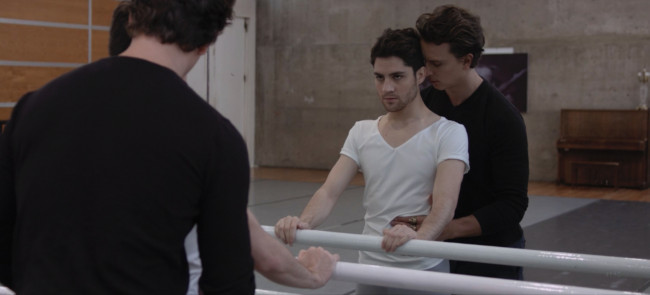 Along with a low-key vibe and the sexy physicality of a group of dancers, this romantic Mexican drama has a home-made feel, with handheld, close-up camerawork and loose editing. This adds a nicely earthy realism to the interaction between likeable characters, which helps overcome the sometimes awkward pacing and melodramatic plotting. Ambitious filmmaker Juan Briseno also adds some artistic touches with a strikingly visual use of the settings At his audition for a prestigious dance company, Sebastian (Saracho) is befriended by fellow dancer Arsenio (Kuri). They initially laugh off their obvious mutual attraction, but soon become a fully loved-up couple, pushing each other as performers. Then harsh new choreographer Mikael (Lacko) arrives, demanding obedience and perfection. The attention he pays to Sebastian begins to make Arsenio jealous, for good reason. Although Arsenio's next move isn't helpful. As darker feelings emerge within the company, Luciano (Coronel) teams up with Arsenio to take action in the run-up to the opening night of their first show. Adding dark psychological edges, the film taps into self-destructive behaviour. Sebastian burns himself to remind himself of greater pain elsewhere, and everyone churns with inner angst as they push themselves to the limit. There's also an offbeat sequence featuring a short film some of them have made, a nutty Swan Lake adaptation with lots of finger-zapping action. All of this allows for enormous emotionality, especially in the dancing, which is skilfully choreographed. The actors find naturalistic rhythms together, in between other more heightened sequences. In the beginning, Saracho and Kuri play Sebastian and Arsenio as a cute couple oblivious to the pressures around them. So where they both go is downright bleak. They play these scenes with honesty that adds strong resonance, although this also makes it tricky to root for them, especially when the cruel jealousy goes way over the top. Meanwhile, Lacko unflinchingly reveals the charismatic Mikael's predatory nature. As things heat up, Sebastian and Arsenio promise not to let things at work interfere with their relationship. But of course they do, in rather harrowing ways. This is an intriguing exploration of the tension between personal and professional lives, as well as more insidious things like abusive behaviour of people in power. So the big climactic moment feel both overly pointed and a bit enigmatic, as the feelings become rather murky. But it remains intriguing and involving right to the dramatic final shot.
|
| The Ugly Stepsister Den Stygge Stesøsteren Review by Rich Cline | 
| 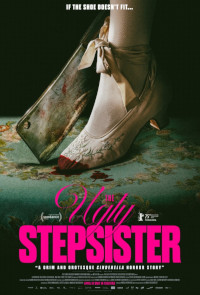 dir-scr Emilie Blichfeldt prd Maria Ekerhovd with Lea Myren, Thea Sofie Loch Naess, Ane Dahl Torp, Flo Fagerli, Isac Calmroth, Cecilia Forss, Katarzyna Herman, Adam Lundgren, Malte Gardinger, Ralph Carlsson, Willy Ramnek Petri, Philip Lenkowsky release Nor 7.Mar.25, US 18.Apr.25, UK 25.Apr.25 25/Norway 1h50 SUNDANCE FILM FEST BERLIN FILM FEST Is it streaming?
| 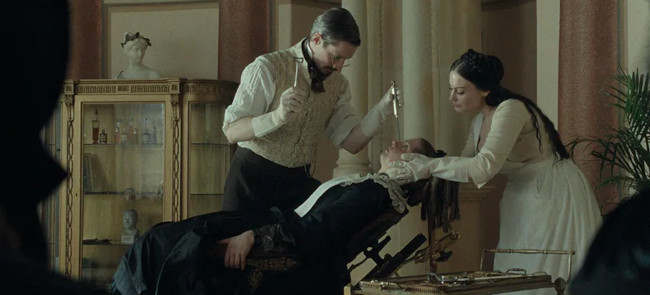 Twisting the perspective of the Cinderella fairy tale, this bonkers Norwegian body-horror comedy is infused with snappy wit, swooning passion and gleefully hideous nastiness. For her first feature, writer-director Emilie Blichfeldt refuses to flinch from the full-on imagery, cleverly diving into the dense production design to create grotesque scenes that aren't easy to forget. Like The Substance, it's rather relentless, but the exploration of body image is powerful. When Rebekka (Dahl Thorp) marries aging nobleman Otto (Carlsson), her plain teen daughters Elvira (Myren) and Alma (Fagerli) move in with Otto's beautiful daughter Agnes (Lock Naess). Then Otto dies suddenly, and Rebekka banishes Agnes to the scullery. To prepare for the forthcoming ball thrown by the eminently eligible Prince Julian (Calmroth), Rebekka hires a surgeon (Lundgren) to fix Elvira with a series of nightmarish treatments, while the kind Sophie (Forss) coaches her on etiquette and the demanding Madame Vanja (Herman) teaches dance. And now Elvira is the envy of the girls who bullied her. Sideplots abound as everyone is overcome with lustiness, including Rebekka and Agnes. Elvira pines for Julian, reading his book of poetry nonstop. She's also susceptible to criticism that comes at her from all sides, enduring brutal surgeries as well as Sophie's offer of a tapeworm to help her slim down. But while she indeed transforms herself into the most beautiful girl at the ball, she of course remains ugly inside. And when Agnes arrives at the ball and catches Julian's eye, Elvira doesn't take it well. Performances have a cartoonish quality that matches the film's over-the-top comical sensibilities, even as things get astonishingly, explicitly gruesome. Myren manages to be likeable as the doe-eyed Elvira, who's so badly treated that it's no wonder she's willing to do whatever it takes to be popular. Loch Naess, Dahl Torp and Fagerli are also able to create nicely rounded characters with their own inner lives, including distinct views of themselves. While the Cinderella plot is largely intact, complete with some magical realism, everything is grounded in these lavish but grotty castles. Blichfeldt has fun with the unnerving grisliness, lurid sexuality and revolting climactic nastiness, but everything has a sharp point, satirising the lengths we go to to make ourselves both fit in and stand out. The way all of this plays out may seem a bit obvious, but it leaves us shaken in the most entertaining way.
| 
See also: SHADOWS FILM FESTIVAL © 2025 by Rich Cline, Shadows
on the Wall
HOME | REVIEWS | NEWS | FESTIVAL | AWARDS
| Q&A | ABOUT | TALKBACK | | ||||||||||||||

